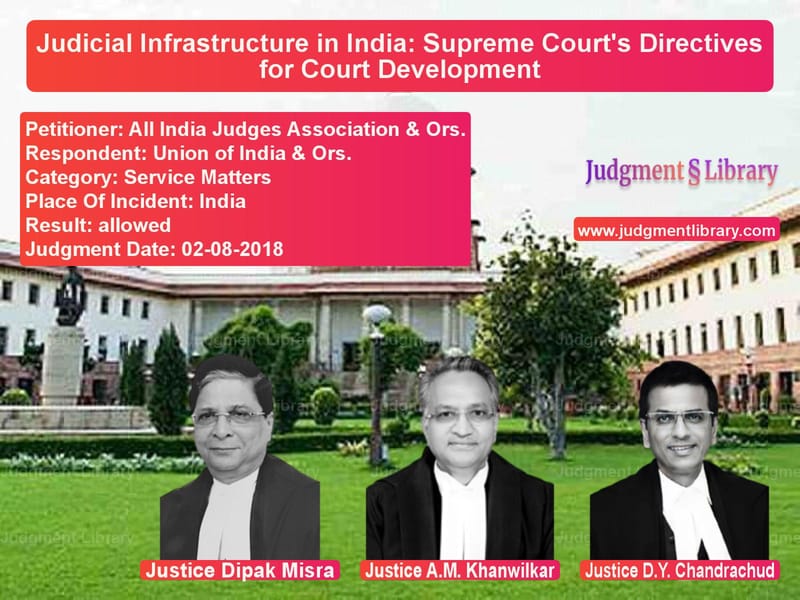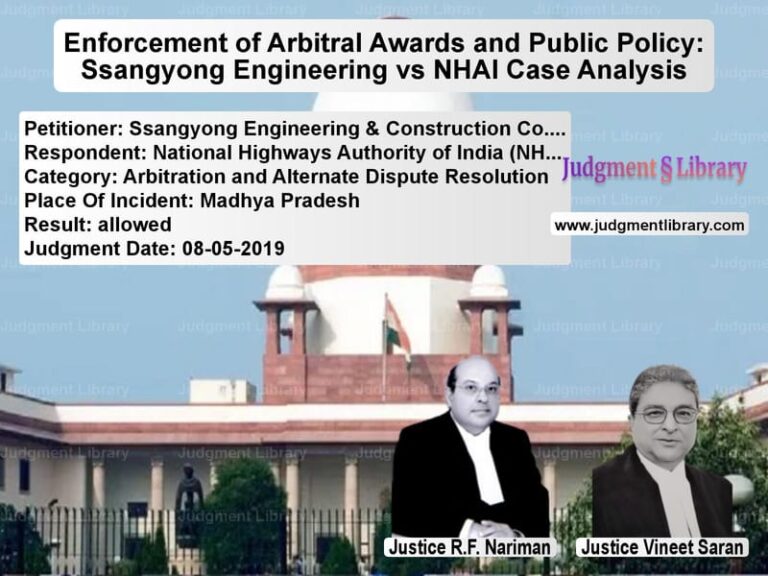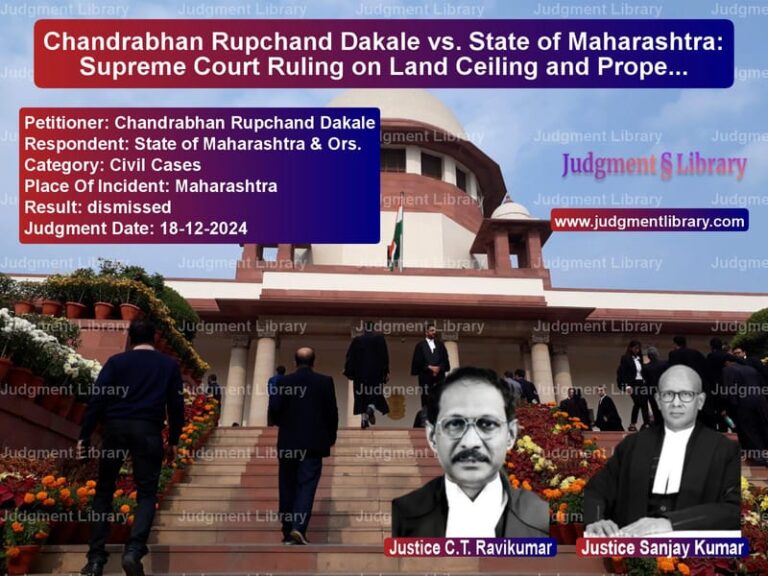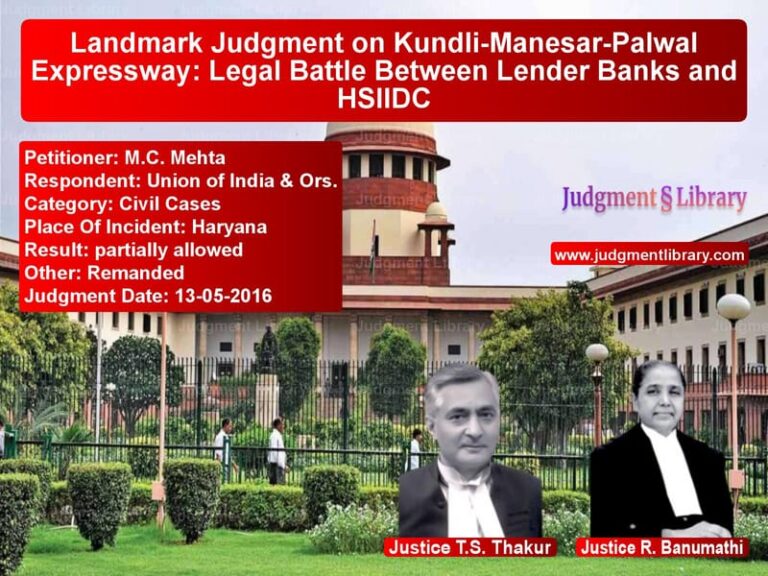Judicial Infrastructure in India: Supreme Court’s Directives for Court Development
The Supreme Court of India, in the case of All India Judges Association & Ors. vs. Union of India & Ors., addressed the crucial issue of judicial infrastructure in the country. This judgment underscores the necessity for improved court infrastructure, particularly for subordinate courts, to ensure efficient access to justice.
The case originated as a writ petition filed by the All India Judges Association seeking comprehensive reforms in judicial working conditions, including better infrastructure, adequate residential facilities for judges, and modern technology in courtrooms.
Background of the Case
The Supreme Court was concerned about the state of judicial infrastructure across the country, particularly in subordinate courts. The petitioners argued that poor infrastructure hinders the effective delivery of justice and sought immediate intervention from the Court.
The Court had passed several orders over the years directing the states to provide details regarding:
- The number of pending proposals for court infrastructure projects.
- Availability of government land for court buildings and judicial quarters.
- Reasons for delays in land acquisition and infrastructure development.
- Steps taken to complete ongoing projects.
- Budget allocations for judicial infrastructure in each state.
Despite multiple directions, progress remained slow, leading the Court to issue strict directives.
Arguments of the Petitioners
The petitioners contended:
- The judiciary plays a vital role in upholding the rule of law, and poor infrastructure obstructs access to justice.
- State governments have consistently failed to allocate sufficient funds for judicial infrastructure, resulting in inadequate court buildings, lack of facilities for litigants, and outdated technology.
- The responsibility of ensuring well-equipped courts lies with the state governments, and their inaction constitutes a violation of fundamental rights.
Arguments of the Respondents
The Union of India and various state governments responded, stating:
- Financial constraints limit their ability to allocate large budgets for judicial infrastructure.
- Efforts have been made to improve court facilities, but bureaucratic and procedural delays affect implementation.
- Some states have undertaken modernization projects, including e-courts and digital case management systems.
Key Observations of the Supreme Court
The Supreme Court strongly criticized the lack of progress in judicial infrastructure development and emphasized:
- “Justice delivery is the bedrock of the rule of law, and without adequate judicial infrastructure, the rule of law cannot be sustained.”
- “Court fees, fines, and costs imposed in litigation must be reasonably reinvested in judicial infrastructure to maintain a robust justice delivery system.”
- “Financial constraints cannot be an excuse for neglecting the judiciary, as access to justice is a fundamental right.”
- “Courts are not merely buildings; they are institutions that embody the ideals of justice. Neglecting infrastructure undermines the very foundation of democracy.”
Supreme Court’s Directives
Recognizing the urgency of the matter, the Supreme Court issued the following directions:
1. Infrastructure Development Plans
- Every state government must prepare and implement a three-tier infrastructure development plan:
- Short-term plan (annual)
- Medium-term plan (five-year)
- Long-term plan (ten-year)
2. Court Infrastructure Requirements
The Court identified the following essential facilities to be provided in all court complexes:
- Modern court buildings with fully equipped courtrooms.
- Judges’ chambers and residential quarters.
- Litigants’ waiting areas and adequate seating.
- Administrative offices, conference rooms, and mediation centers.
- Separate washrooms for men, women, and persons with disabilities.
- Libraries, bar association rooms, and consultation spaces for lawyers.
- Basic amenities such as drinking water, electricity, air-conditioning, and canteen facilities.
- Video conferencing rooms and e-court infrastructure.
- Dedicated parking areas for judges, lawyers, litigants, and court staff.
3. Digital Infrastructure
- Mandatory implementation of e-filing, e-courts, and case management systems.
- Installation of electronic display boards for case listings.
- Provision of video conferencing facilities for remote hearings.
- Deployment of case tracking systems for litigants and lawyers.
4. Accessibility and Security
- All court complexes must be made accessible to persons with disabilities.
- Installation of ramps, tactile paving, and braille signages.
- Upgraded security measures, including CCTV cameras.
- Separate waiting areas for vulnerable witnesses and children.
5. Financial Allocation
- States must allocate a specific budget for judicial infrastructure as a part of planned expenditure.
- Judicial infrastructure development should not be subjected to arbitrary budget cuts.
- Annual reporting on infrastructure spending must be submitted to the Supreme Court.
Final Judgment
The Supreme Court emphasized that judicial infrastructure is an essential component of governance and not a discretionary expenditure. The judgment concludes:
“Access to justice will remain an illusion if court premises are not adequately equipped. The state must ensure that judicial infrastructure is not neglected and that courts function in an environment conducive to justice delivery.”
The Court scheduled a follow-up hearing for 23 August 2018 to review compliance with its directions.
Petitioner Name: All India Judges Association & Ors..Respondent Name: Union of India & Ors..Judgment By: Justice Dipak Misra, Justice A.M. Khanwilkar, Justice D.Y. Chandrachud.Place Of Incident: India.Judgment Date: 02-08-2018.
Don’t miss out on the full details! Download the complete judgment in PDF format below and gain valuable insights instantly!
Download Judgment: All India Judges Ass vs Union of India & Ors Supreme Court of India Judgment Dated 02-08-2018.pdf
Direct Downlaod Judgment: Direct downlaod this Judgment
See all petitions in Public Sector Employees
See all petitions in Workplace Harassment
See all petitions in Recruitment Policies
See all petitions in Judgment by Dipak Misra
See all petitions in Judgment by A M Khanwilkar
See all petitions in Judgment by Dhananjaya Y Chandrachud
See all petitions in allowed
See all petitions in supreme court of India judgments August 2018
See all petitions in 2018 judgments
See all posts in Service Matters Category
See all allowed petitions in Service Matters Category
See all Dismissed petitions in Service Matters Category
See all partially allowed petitions in Service Matters Category







